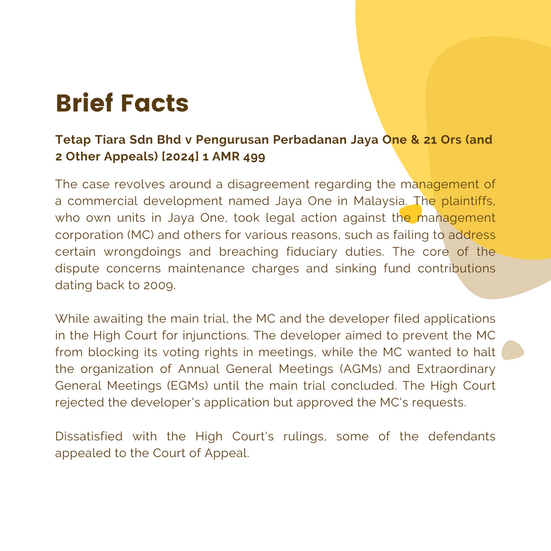Is it Possible for Courts to Delay AGMs and EGMs?
- brandonwong528
- Apr 16, 2024
- 2 min read
Updated: Jan 2, 2025
by MH Law | April 16, 2024 | Case Study
_______________________________________________________________________________
Overview
This case centers on a dispute regarding the management of a commercial property, Jaya One, focusing on maintenance charges, sinking fund contributions, and the statutory responsibilities of the Management Corporation (MC) under the Strata Management Act 2013 (SMA).
_______________________________________________________________________________
Key Issues & Facts
Background:
The plaintiffs, unit owners in Jaya One, alleged mismanagement and fiduciary breaches by the MC and others.
The MC and the developer filed injunction applications in the High Court:
Developer: Sought to prevent the MC from obstructing its voting rights.
MC: Sought to delay Annual General Meetings (AGMs) and Extraordinary General Meetings (EGMs) until the main trial concluded.
The High Court approved the MC’s application but rejected the developer's. Dissatisfied, certain defendants appealed to the Court of Appeal.
Court of Appeal Decision:
Rejected the MC’s request to delay AGMs/EGMs, citing the explicit statutory duties outlined in the SMA.
Affirmed the developer’s voting rights, ensuring statutory compliance.
_______________________________________________________________________________
Key findings of Court of Appeal
MC's Statutory Obligations:
The MC, as a statutory body under the SMA, is legally required to:
Conduct AGMs annually.
Convene EGMs upon valid requests from parcel owners.
The Court ruled that these duties must be fulfilled regardless of ongoing litigation.
Precedence of Specific Provisions:
Dismissed the MC’s reliance on the general provisions of the Courts of Judicature Act 1964 (CJA) to delay meetings.
Reinforced the supremacy of the specific SMA provisions over general laws, ensuring no statutory obligations are circumvented.
Preservation of Plaintiffs’ Claims:
Held that plaintiffs’ claims could proceed irrespective of the AGMs/EGMs, eliminating any justification to delay these statutory meetings.
Preventing Misuse of Injunctions:
The Court emphasized that injunctions should not be employed to evade legal responsibilities or obstruct statutory rights.
_______________________________________________________________________________
Implications
Protecting Owners’ Rights:
Ensures parcel owners can request and participate in AGMs/EGMs, promoting transparency, accountability, and democratic governance in strata developments.
Upholding Judicial Integrity:
Reaffirms that courts must adhere to legislative intent and the explicit provisions of statutes like the SMA, avoiding overreach through general legal principles.
Preventing Abuse of Legal Processes:
Sets a precedent against using litigation as a tool to delay statutory obligations or hinder owners’ rights.
_______________________________________________________________________________
Key Takeaways
Mandatory AGMs/EGMs:
Management corporations must conduct AGMs annually and EGMs upon valid requests, without exception or undue delay.
No Broad Discretion to Delay Meetings:
Courts cannot extend deadlines for statutory meetings or allow their postponement based solely on pending litigation.
Balance of Rights and Responsibilities:
The ruling ensures that parcel owners’ rights to participation and governance are preserved while litigation continues without unnecessary disruptions to statutory processes.
****
Have a question? Please contact us at info@munhoelaw.com

















